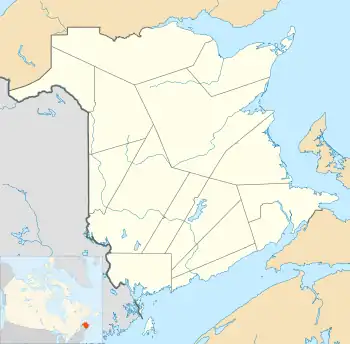Hartin Settlement | |
|---|---|
Settlement | |
 Hartin Settlement Location in New Brunswick | |
| Coordinates: 45°53′46″N 67°32′28″W / 45.89598°N 67.54105°W | |
| Country | Canada |
| Province | New Brunswick |
| Parish | Canterbury |
| County | York |
| Founded by | Thomas Hartin |
Hartin Settlement is a small rural community in western York County, New Brunswick, Canada. Formerly a farming community, it is now home to approximately twenty families. It is located near Lakeland Ridges, New Brunswick.
History
The settlement is named for Thomas Robinson Hartin Sr. Reverend, who encouraged people to settle in this area in 1865. It was settled primarily by Episcopalians from different parts of the province.[1] The petition by Thomas Hartin to found the settlement was signed in 1862 by Surveyor General, John McMillan.[2]
By 1866, Hartin Settlement was a farming community with approximately 26 families. Most of these families survived off of small farms on their land. During this time every land owner had to clear trees and have a building on their property. The community also had to work together to maintain the road.
Hartin Settlement had a schoolhouse for grades one to eight. The Chief Superintendent of Education noted it as: "This school is well equipped and does very good work" [3] Being a rural school, it closed in 1967 due to the Equal Opportunity Program and was demolished in 1983/84.
In 1889, a total of 5 people had been infected by an outbreak of diphtheria.[4][5]
On 25 November 1886, Elisha Lewis found an unknown man's body near Hartin Settlement at a location now known as Dead Man's Corner. Because he could not be identified by the coroner, a description was posted in the Press Newspaper on 8 December 1886: "Deceased was about 5 feet 8 inches in height, and about 65 years of age. He wore a brown reefer, lined with blue flannel, no vest, colored pants, blue woolen outside shirt, plaided homespun inside shirt and drawers; he had on an old pair of boots, and wore a brown woolen cap. A black felt hat, and pocketbook containing $2.39, was found on his person."[6] This description matched that of a fugitive from Maine named Calvin Graves, who was being pursued for the murder of two game wardens in Maine.[7] This unknown male was the first to be buried in the Hartin Settlement Cemetery, because no one could determine his religious denomination.
From about 1886-1933 members of the Annis family who died were buried in the Hartin Settlement cemetery alongside members of the Oliver family, and the unknown man. The cemetery wasn’t kept up well, and it was soon overgrown. The first attempt to restore it was made in the 1940s, and again around 1972. In 1979, people of the community began restoring it again and found out some of the forgotten names of people buried there. Finally in 2016, it was fully cleared, and even more people were found there amounting to ten in total.
Hartin Settlement got power in 1950, and around this time about 104 people lived in the community.[8]
Notable people
Rev. Thomas Robinson Hartin
Thomas Hartin Rev. was born in Ireland (1815) and sailed to Canada in 1832. He was ordained 15 June 1851, at Christ Church Cathedral in Fredericton by John Medley, Bishop of Fredericton, and became a priest on 21 February 1869.
In 1865 he encouraged people to form Hartin Settlement 4.29 km WNW of Canterbury.[9] On 11 September 1875 he & his wife gave 600 acres of their land for the building of Holy Trinity Church in Canterbury, which is still in existence and active today.[10]
He died on 21 January 1891 at his home in Canterbury Station. He is buried in the Parish Cemetery, Lakeland Ridges.
Geography
Located 4.29 km WNW of Lakeland Ridges: Canterbury Parish, York County
Area: About 105.21827 km
Contains Little Mud Lake, and Arrons Stream
Originally divided into 26 plots of land of 100 acres each.[11]
See also
References
- ↑ "Proceedings and transactions of the Royal Society of Canada. Délibérations et mémoires de la Société royale du Canada". archive.org. Retrieved 25 August 2017.
- ↑ "Provincial Archives of New Brunswick". archives.gnb.ca. Retrieved 25 August 2017.
- ↑ Education, New Brunswick Dept of (1938). Rapport Annuel Du Ministre de L'Education, Province Du Nouveau-Brunswick. s.n.
- ↑ Journal of the Legislative Council of the Province of New Brunswick ... 1890.
- ↑ "Diphtheria in New Brunswick in the Year 1889". johnwood1946. 6 May 2015. Retrieved 25 August 2017.
- ↑ "newspage39". www.rootsweb.ancestry.com. Retrieved 25 August 2017.
- ↑ "Fiendish Double Murder. Two Men Murdered in Cold Blood" (PDF). www.calaisalumni.org. 13 November 1986.
- ↑ "Population : unincorporated villages and hamlets = Population : villages et hameaux non constitués". archive.org. Retrieved 25 August 2017.
- ↑ "Proceedings and transactions of the Royal Society of Canada. Délibérations et mémoires de la Société royale du Canada". archive.org. Retrieved 25 August 2017.
- ↑ Barnett, Cleadie B. "Rev. Thomas Hartin - Biographical Data". www.rootsweb.ancestry.com. Retrieved 25 August 2017.
- ↑ "Provincial Archives of New Brunswick". archives.gnb.ca. Retrieved 25 August 2017.
http://archives.gnb.ca/Exhibits/Communities/Details.aspx?culture=en-CA&community=1678
http://www.rootsweb.ancestry.com/~nbyork/hartin/pafg02.htm#728